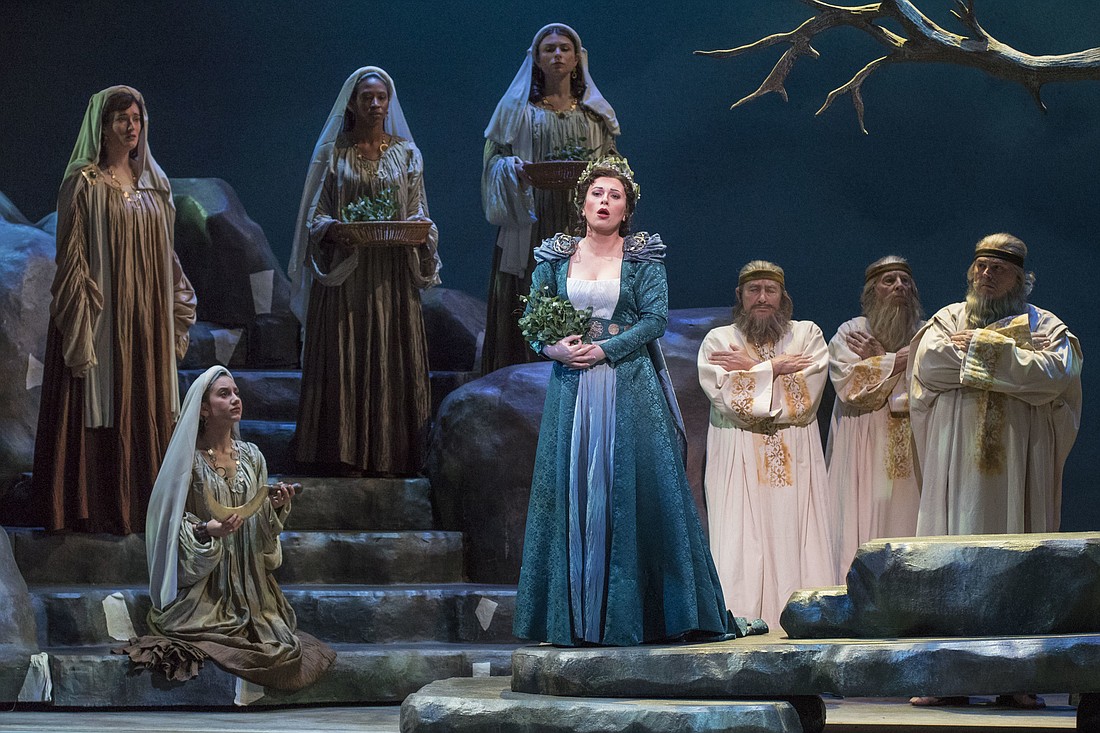- April 17, 2024
-
-
Loading

Loading

A vocally exciting “Norma” opened the second half of the winter season of the Sarasota Opera on Saturday night, which was the company’s first production of Bellini’s opera.
“Norma” had its first performance in 1835 and in the ensuing years has become both well known and seldom performed. The question is how can an opera occupy both categories at once. A simple answer would be “outstanding singers,” for outstanding singing lies at the core of both the charm and pitfalls of the opera.
First, a brief look at the plot that instigates all this lovely melody:
Set in Roman-occupied Gaul, “Norma” involves a love triangle with Norma, who has broken her priestly vows by secretly bearing two children by Roman proconsul Pollione. He has tired of Norma and is now in love with Adalgisa, a young priestess of the temple. The two women realize they have unknowingly loved the same man, and their relationship breaks, then reunites, over their mutual anger toward Pollione. In the end, Norma, having betrayed her religious vows, must sacrifice her life. She leaves her children with Adalgisa, while Pollione and Norma, renewing their love, are again joined together in sacrificing their lives.
The score of “Norma,” with its story of a Druid priestess challenged and tormented by love and duty is a prime example of bel canto, which literally means “beautiful singing.” Bellini wrote long stretches of recitative, a dialogue sing-speech, punctuated by chords and short orchestral passages. These recitatives evolve into set pieces of arias, duets, and trios packed with long lines of lyrical beauty, which are better heard than described. Soprano Renata Scotto called “Norma” the “Everest of opera,” and in many ways she is correct, for Norma is at the top of virtually every soprano’s to-sing list.
The role of Norma calls for a soprano of extended range, excellent flexibility, with sufficient breath control and vocal heft to match the melodic and dramatic range called for by Bellini. Joanna Parisi, singing her first Norma, seems equal to the task, ranging from a rather dark lower and middle register to a ringing top voice. Her singing of the famed “Casta Diva” aria in which Norma offers a prayer to the Moon Goddess, was eloquent and beautiful. Throughout the evening, her top notes at times verged on being strident and piercing, which could be attributed to all the emotion of an opening performance of this formidable role, as perhaps were a few instances of rather muddy coloratura.
Adalgisa, the young priestess who is Norma’s friend, archrival and friend again, is often sung by a mezzo-soprano, although Bellini wrote it for a soprano. Jennifer Black’s clear and lovely soprano voice contrasted nicely with Parisi’s somewhat darker sound. Black’s Act 1 aria and duet with Pollione were excellent, and both she and Parisi shared vocal abundance in the famous “Mira, o Norma” duet in Act 2.
As Pollione, tenor Cameron Schutza has a strong and virile sound, but his somewhat perfunctory delivery and stage presence did little to portray him as the love object of the two women. Bass Young Bok Kim, a stalwart veteran of many seasons, was in particularly good voice as Oroveso, Norma’s father, and the two smaller roles of Clotilde and Flavio were ably sung by studio artists Nicole Woodward and Thomas Massey.
The chorus of opera apprentices, trained by Roger L. Bingaman, was impressive as always, especially the chorus of men in the opening scene.
Credit for much of the evening’s success must go to conductor Victor DeRenzi, who led a seamless and outstanding performance. His pacing of the long recitative sections allowed them to be expressive but always moving forward. The overall balance and orchestral nuance were most impressive, giving meaning to even the most simple accompaniment passages. DeRenzi obviously loves this opera, which was evident from start to finish.
By its very nature, “Norma” is a stand-and-sing opera, more about the feelings, thoughts and emotions of the characters than any real action, but stage director Mark Frieman still provided meaningful movement and stage pictures for the singers.
Michael Schweikardt’s excellent sets and Ken Yunker’s lighting evoked the stark environs of the ancient Druids, as did the costumes, coordinated by Howard Tzvi Kaplan.
All in all, this “Norma” is not only a rewarding evening at the opera, but also ample evidence of Sarasota Opera’s desire and intent to expand the repertoire of both the company and its audience.